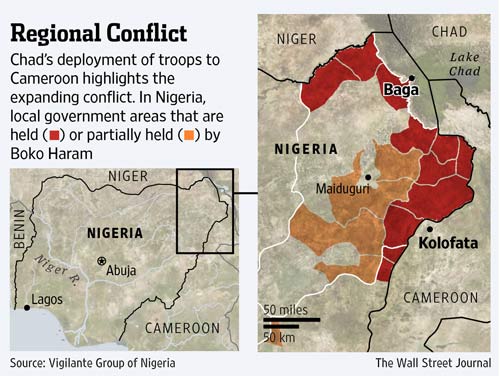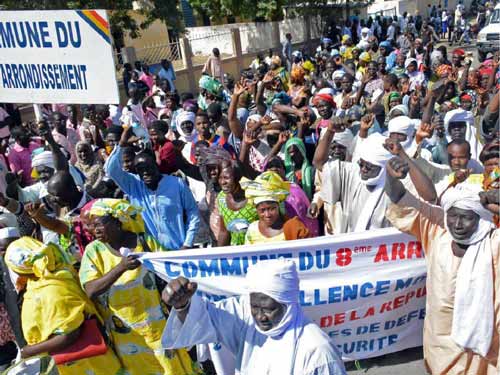NOTES: Boko Haram was born in Nigeria, in the deep poverty of the country’s northeast, but increasingly it threatens neighboring nations. Niger, Chad and Cameroon all share a four-way border with Nigeria. Only sparsely populated mountains and thin, desert-like forests separate them from Boko Haram’s heartland.
In fact, those borders—drawn in the 1880s by Europeans who had yet to fully explore the area—cut through the core land of West Africa’s Kanuri people, a Nigerian ethnic group whose members today make up the bulk of Boko Haram’s ranks. Villages on both sides of the border speak Kanuri. Religious ideas flow freely in the area: Much of Boko Haram’s fundamentalist creed draws on the sermons of a Cameroonian Muslim preacher who moved to Nigeria in the 1940s.
Five years into its war with Nigeria, Boko Haram is now trying to arouse religious sentiment beyond its borders, echoing how Islamic State rallies Sunni Muslims on both ends of the colonial-drawn boundary between Iraq and Syria.
Earlier this month, Boko Haram’s purported leader, Abubakar Shekau, released a video declaring war on Cameroon and calling on his followers there to rise up. “Your troops cannot do anything to us,” he said, before firing an assault rifle into the sky.
Except from Wall Street Journal article: Chad Soldiers to Fight Boko Haram in Cameroon
Boko Haram Stages Attacks in Nigeria and Cameroon
ABUJA, Nigeria — Jan 18, 2015, 12:34 PM ET
By BASHIR ADIGUN and ROBBIE COREY-BOULET Associated Press
 Boko Haram attacked a village in northern Cameroon early Sunday, killing three people and staging its largest kidnapping yet in the country, the information minister said, adding that some of the hostages were children.
Boko Haram attacked a village in northern Cameroon early Sunday, killing three people and staging its largest kidnapping yet in the country, the information minister said, adding that some of the hostages were children.
In a separate attack in Nigeria, a suicide bomber killed four people and injured 35 others in the northeast town of Potiskum, according to a Nigerian media outlet.
The Cameroon attack occurred in Mabass village, in the Far North region, Issa Tchiroma Bakary said. He said 80 houses were destroyed and “between 30 and 50” people were believed to have been abducted.
“We are dealing with barbaric people, lawless people,” Bakary said. “Nothing can prevent them from assassinating.”
The attacks in Nigeria and Cameroon highlight the growing regional threat posed by Boko Haram. The attacks occurred three days after Cameroon President Paul Biya announced Chad would send “an important contingent” to support Cameroon’s army as it tries to repel the extremists’ intensifying offensive.
On Sunday, Chadian troops began arriving in Cameroon, heading straight to the north, Cameroon’s information minister said.
Thousands of demonstrators took to the streets of Chad’s capital, N’Djamena, on Saturday to support the deployment, according to an article posted on the official website of Chad’s presidency.
Boko Haram has been recruiting fighters in Cameroon, Chad and Niger, and the group recently issued a video threatening Biya.
The attack in Potiskum, the largest commercial center in Nigeria’s Yobe state, occurred at around 10 a.m. near a gasoline station, Channels Television said. There was no immediate claim of responsibility.
The suicide bombing was the third such attack this month in Potiskum, and came as Boko Haram has escalated attacks and seized more territory in Nigeria’s northeast.
On Jan. 3, the group swept into the Nigerian town of Baga, near Chad, for one of its most brazen assaults yet, overrunning a military base and killing hundreds of civilians over several days, according to witness accounts.
The assault spurred further talk of organizing a multinational force to fight the rebels, though it does not appear imminent.
———
Corey-Boulet contributed from Abidjan, Ivory Coast.
PHOTO
People march during a rally in N’Djamena on January 17, 2015 to show their support of the authorities’ decision to send troops to fight Nigeria’s Boko Haram Islamists. AFP/Getty Images
POLL


